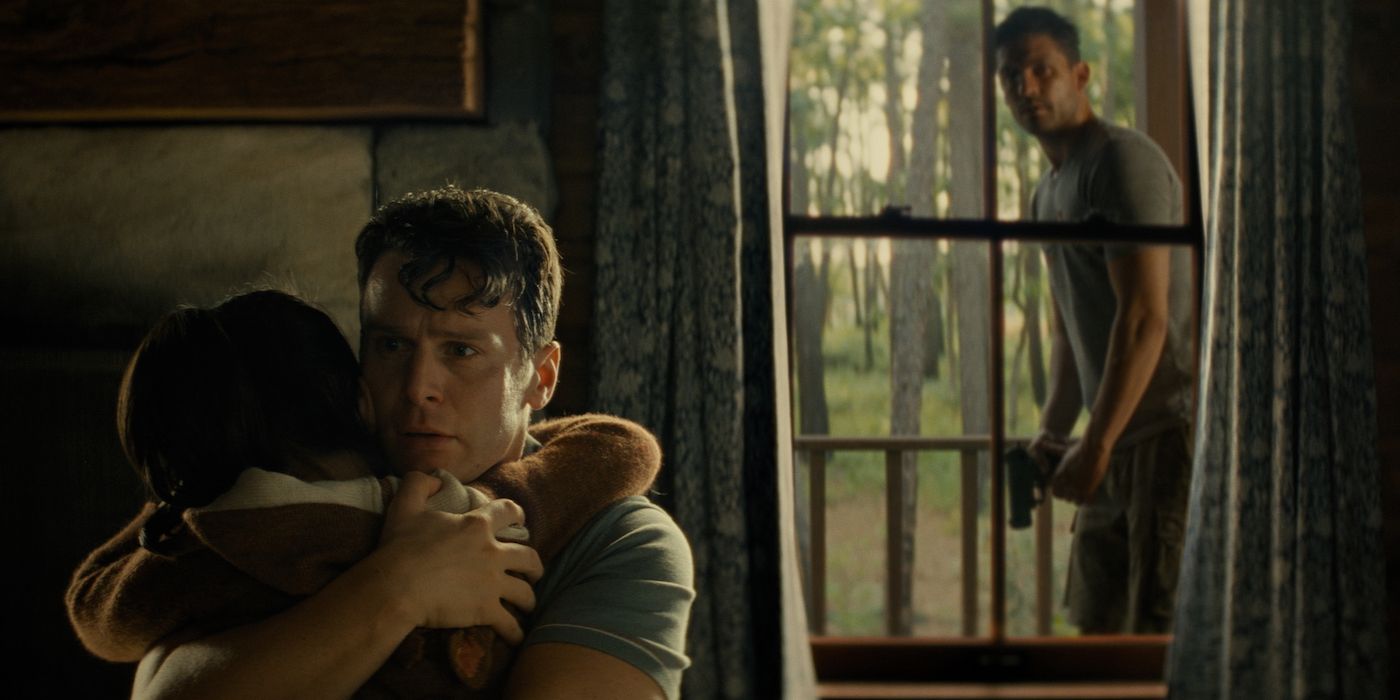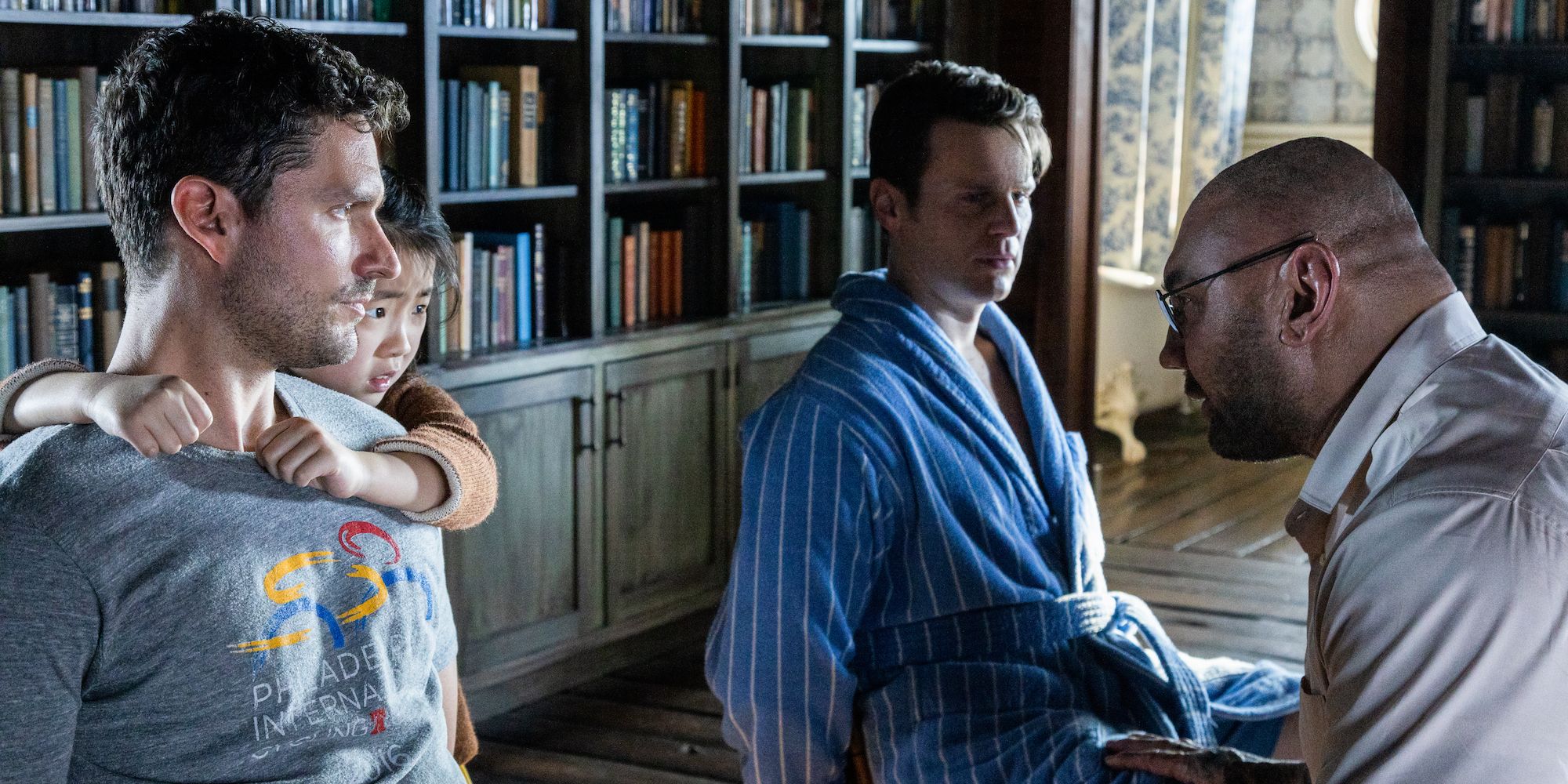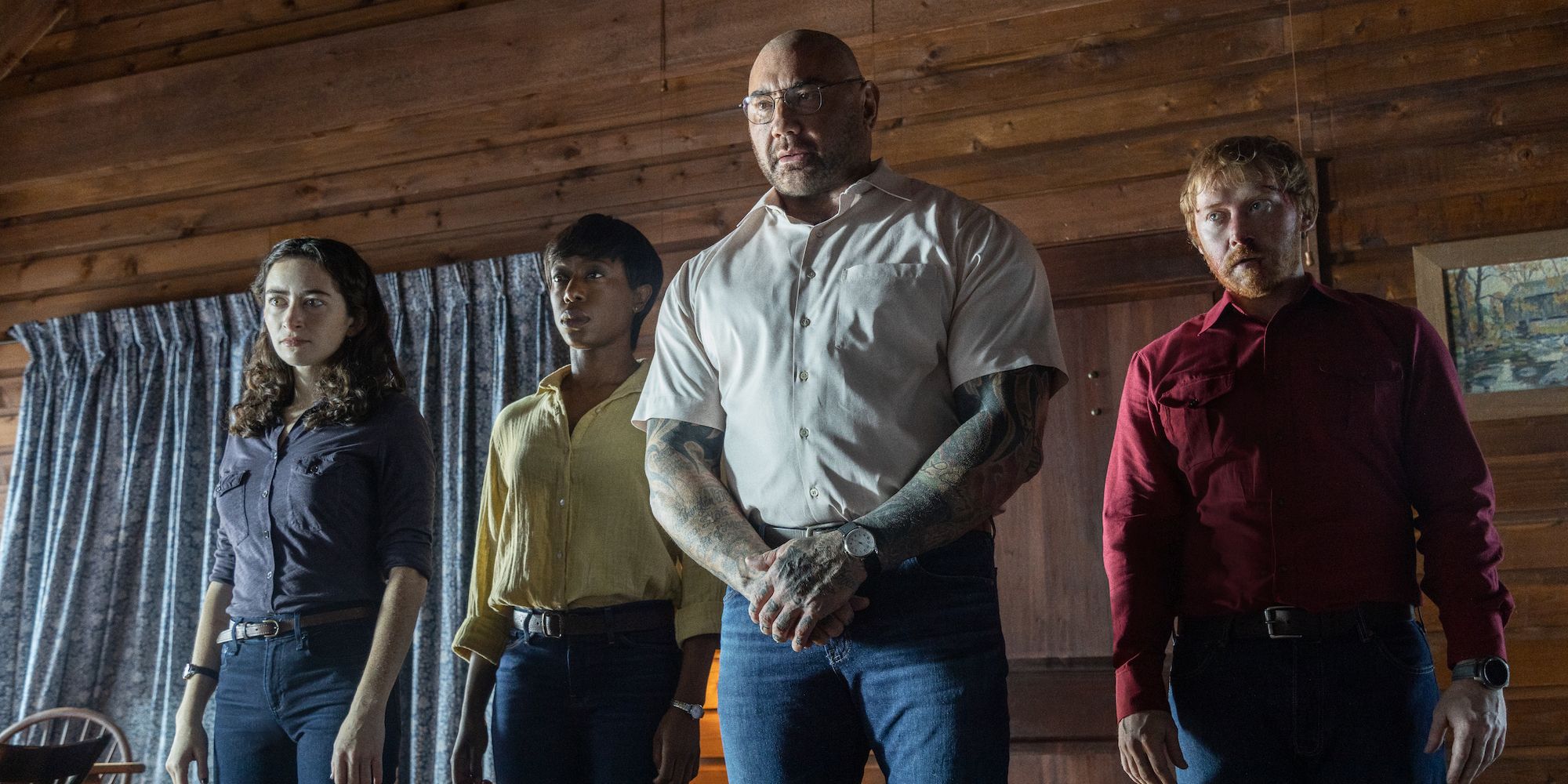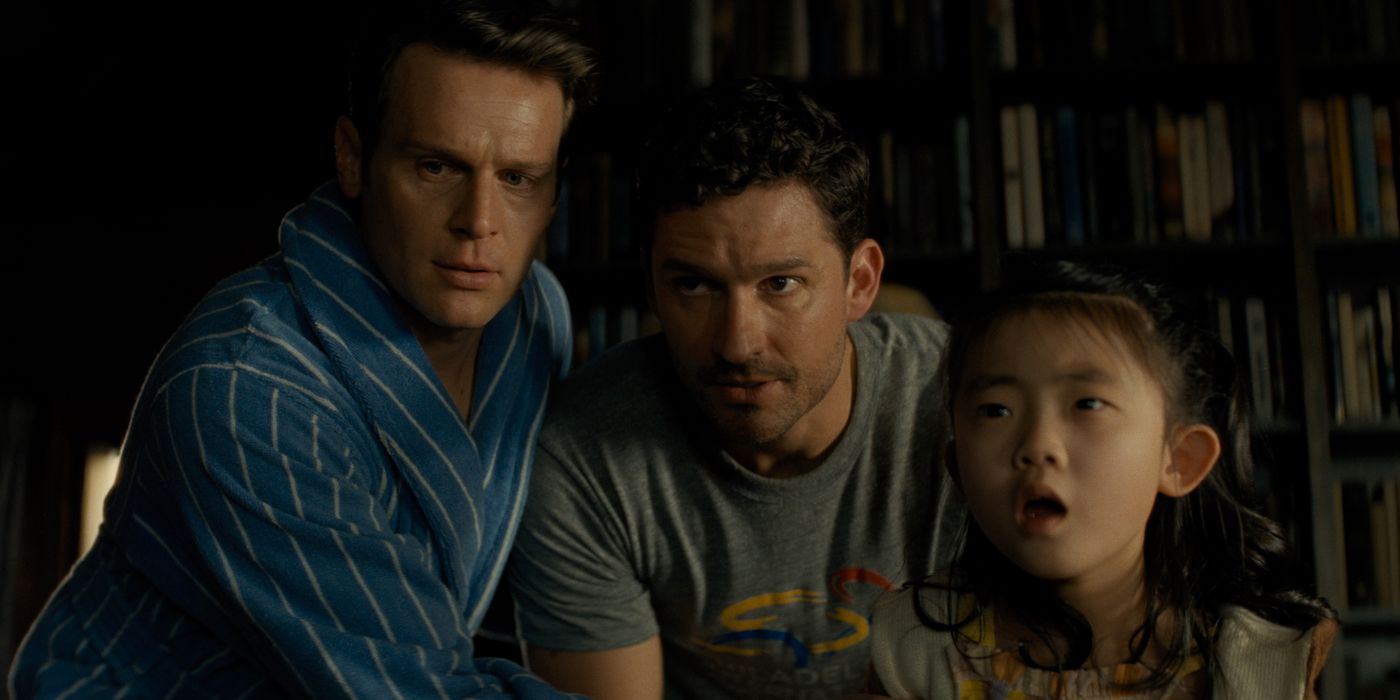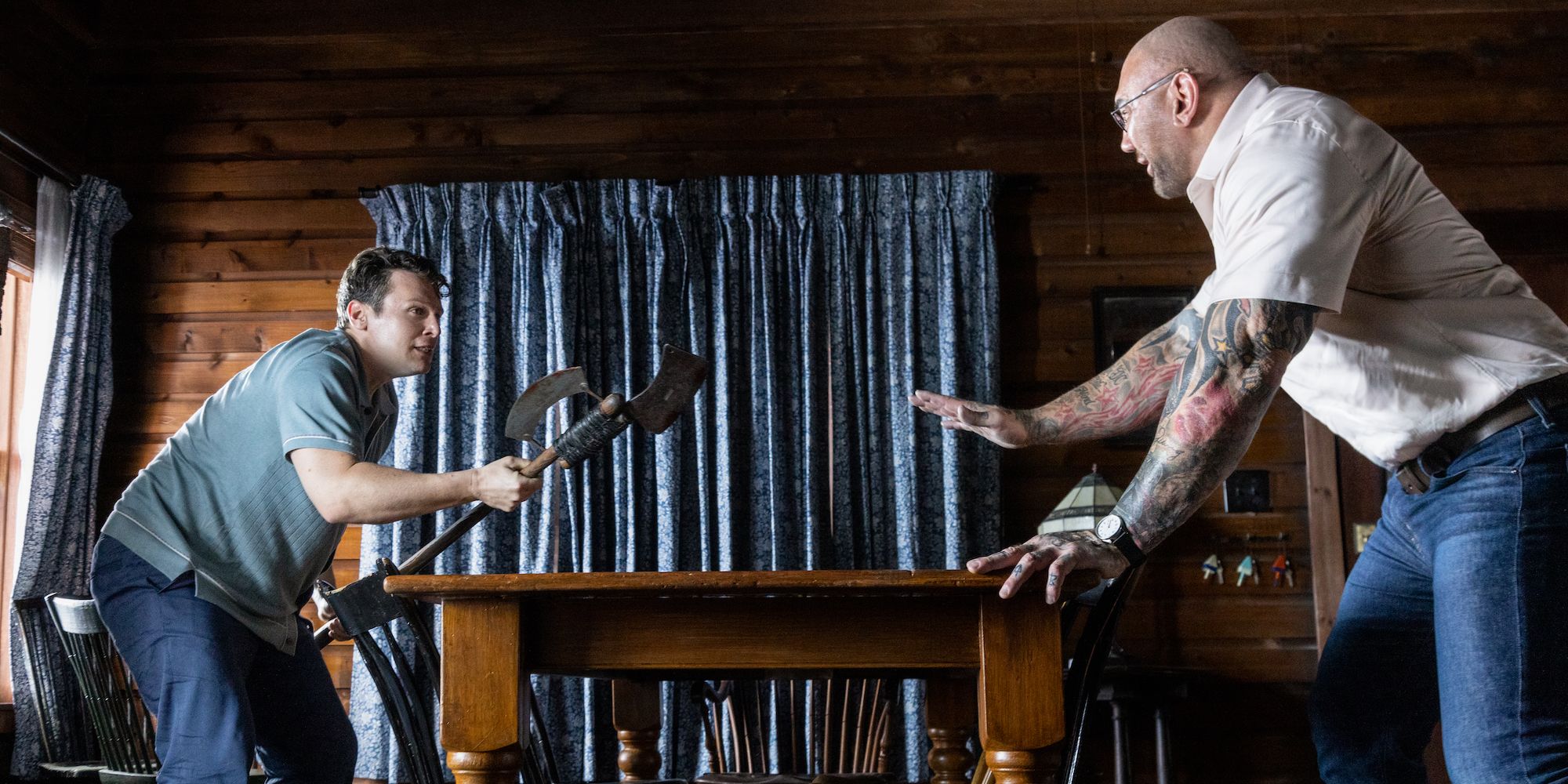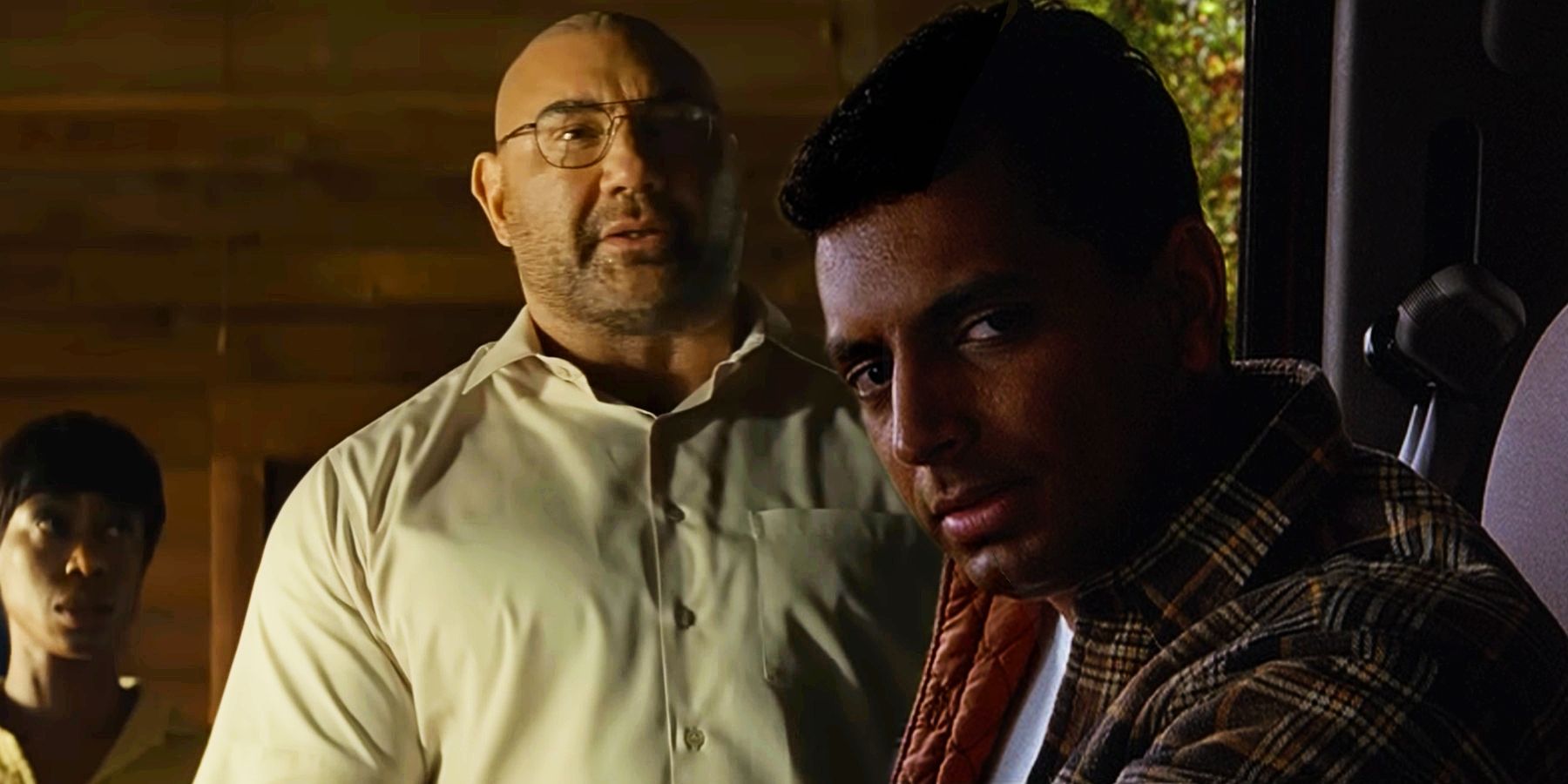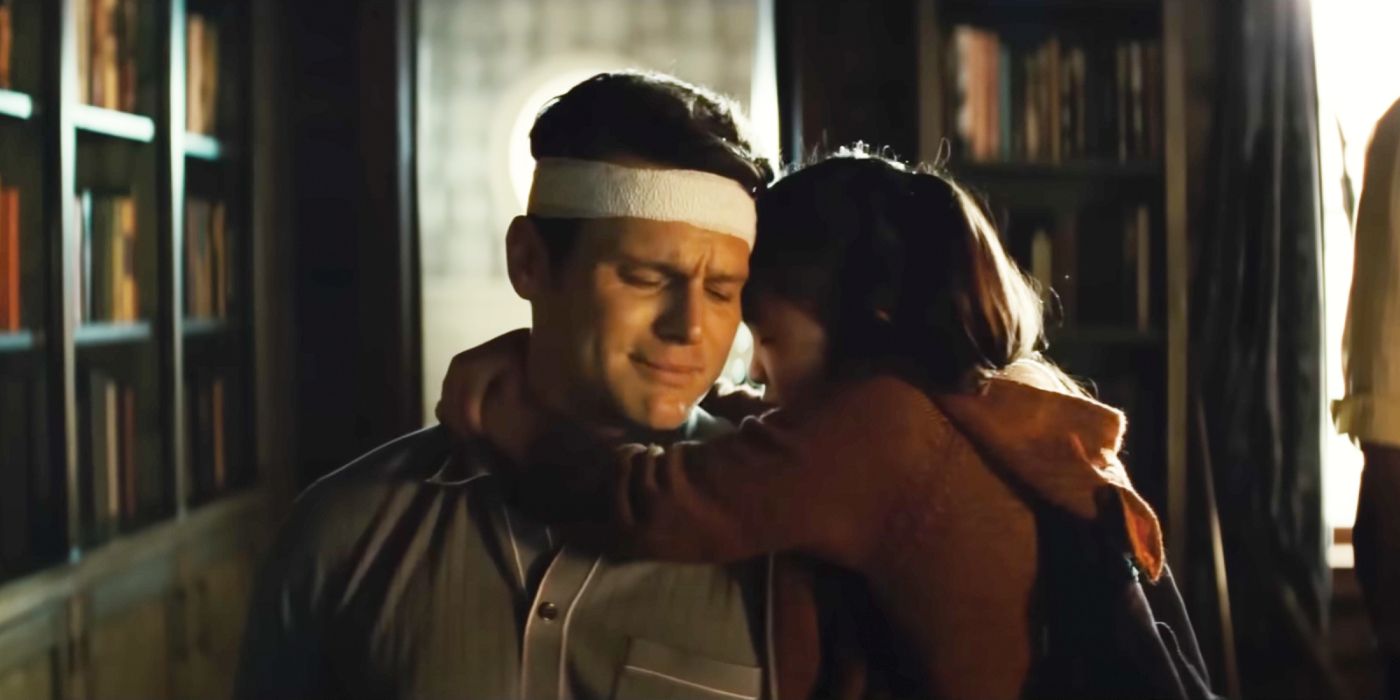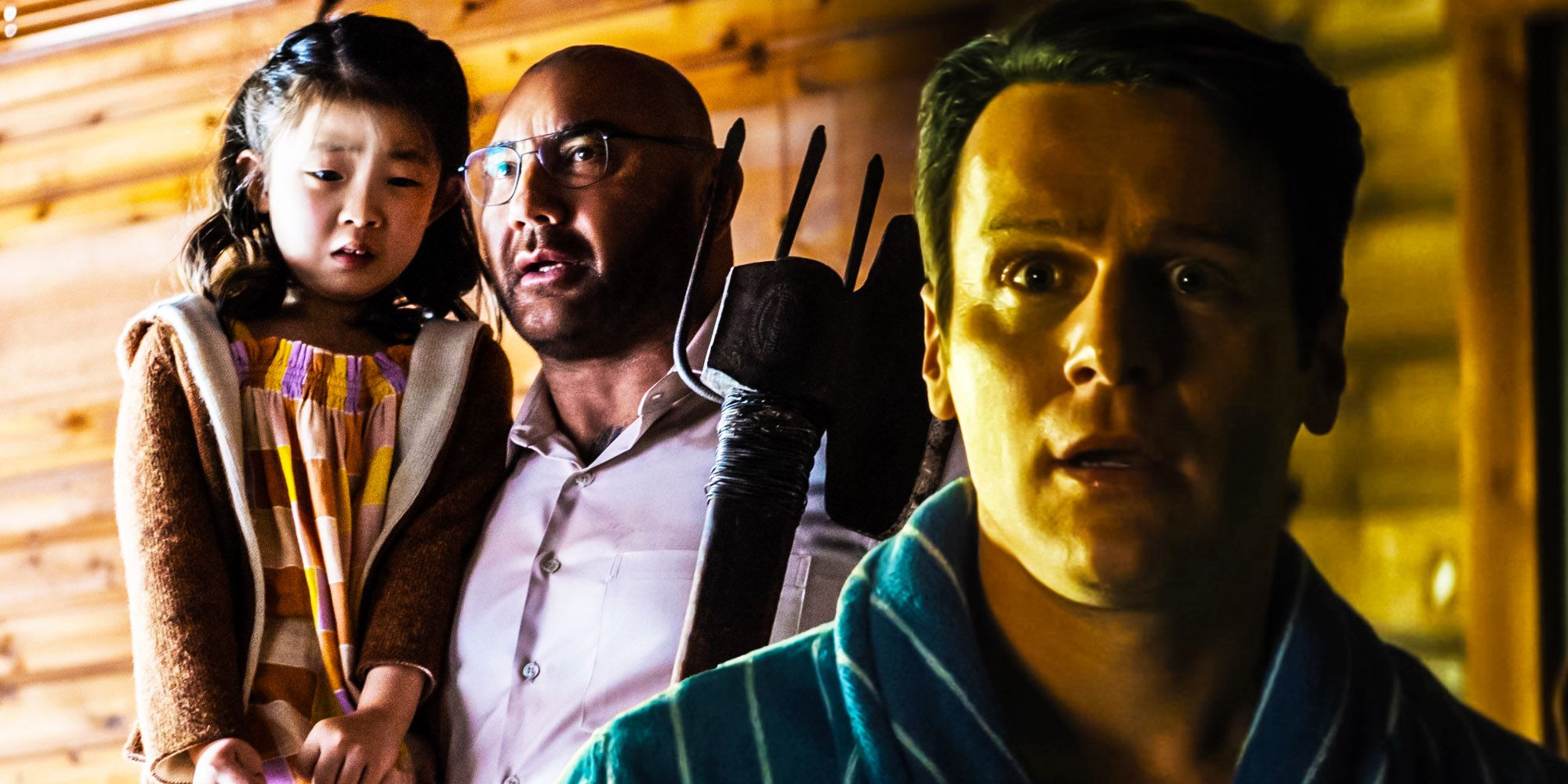2023’s Knock at the Cabin is underpinned by a deep meaning, one that, when explained in full, reveals just how cerebral yet bleak the M. Night Shyamalan movie truly is. Co-written by Steve Desmond and Michael Sherman, Knock at the Cabin sees Shyamalan back once again, telling a story of an apocalyptic situation. However, unlike Signs or The Happening, the characters in Knock at the Cabin know they have the power to stop the collapse of civilization — it’s what they must do to achieve it that makes the movie so harrowing.
The Knock at the Cabin ends with Leonard, Redmond, Sabrina, and Adriane dead, with Andrew still firm in his decision to save his family. However, Eric decides for them — Eric sacrifices himself to stop the apocalypse. Offscreen, a gunshot is heard, presumably with Andrew killing Eric. The planes stop falling from the sky, and the lightning ceases. Shortly after, Knock at the Cabin’s Andrew and Wen leave the cabin in Leonard’s car together. It’s a bitter ending that’s difficult to swallow, and there’s clearly a much deeper meaning behind it and the nature of Andrew and Eric’s choice.
Why Eric & Andrew’s Family Was Chosen To Save The World
The Purity Of Their Family Dynamic May Have Been Why They Were Targeted
One of the biggest questions that Knock at the Cabin explains somewhat ambiguously is why Eric and Andrew were chosen in the first place. Even Leonard and his three associates don’t really know the answer to why Eric, Andrew, and Wen are the family selected to prevent the apocalypse in Knock at the Cabin. Leonard believes the Knock at the Cabin sacrifice was chosen because Eric and Andrew’s love for one another is pure. Compared to the darkness of the world and all the obstacles Eric and Andrew had to overcome to maintain their love, Leonard’s assertions seem accurate.
The
Knock at the Cabin
ending explains how such a strong love is a beacon of hope amidst all the hate, destruction, and violence humanity has wrought.
The group’s collective visions only pointed them toward a cabin, and they didn’t know Eric and Andrew would be the occupants. In all actuality, Knock at the Cabin explained it could’ve been anyone who was in the cabin. However, considering how hard Eric and Andrew fight for each other and their daughter, as well as how they never doubt their love for one another despite others (and societal standards) wanting to bring them down, it’s possible the depth of their love was enough to save the world.
The Knock at the Cabin ending explains how such a strong love is a beacon of hope amidst all the hate, destruction, and violence humanity has wrought. The strength of Eric and Andrew’s love is also a testament to love breaking boundaries and societal norms, thriving because two people saw the best in each other and simply wanted to build their relationship on trust, mutual respect, and love.
Were The Apocalyptic Events Real Or A Timed Coincidence?
The End Of The World In Knock At The Cabin Is Ambiguous
Knock at the Cabin explains that Leonard and his associates are convinced the apocalypse is real, but Andrew is in disbelief for the entirety of the movie. The events the characters witness on TV could have been predicted beforehand and then timed to Leonard’s team’s arrival at the cabin. After all, even Leonard admits that the end of the world has been coming before he and his crew began having visions.
The answer ultimately comes down to perception, and the proof is vague enough that it could go either way.
Viruses have killed many, and earthquakes have brought destruction. Leonard and his associates might have been following the patterns, predicted something big was going to happen for a short while, and that’s when they decided to strike. However, there is also enough evidence in the Knock at the Cabin ending to explain the world was indeed saved because of Andrew and Eric’s decision.
The planes stopped crashing to the ground abruptly, children stopped dying from the X9 virus, and the waters stopped rising following the tsunamis. The world was deeply affected by the calamities, but Eric’s death hints that Leonard’s crew was indeed telling the truth. It could have all been a coincidence, though, and Shyamalan’s film wanted the audience to question whether it was all real or not. The answer ultimately comes down to perception, and the proof is vague enough that it could go either way.
Why Eric Decided To Sacrifice Himself Instead Of Andrew
Eric Knew Wen Had A Better Future With Andrew
The decision made by Eric was a surprising moment in Knock at the Cabin, but the movie did a surprisingly good job of explaining his rationale. Eric was at peace by the end of Knock at the Cabin, which is why he decides to sacrifice himself instead of allowing Andrew to die. He knew Andrew had a lot of fight left in him. Andrew saw the world for what it was, but he still fought for people every day as a human rights lawyer because he knew there was something worth fighting for.
Andrew’s stubbornness would help him make his way through the world, his protective nature would help in raising the couple’s daughter, and his doubts about the apocalypse would make him curious enough to search for answers. Andrew is who the world needed — not Eric. Eric realized that and knew that Andrew’s passion and drive would allow him to go on regardless of his loss. It’s different from the book where Andrew and Eric both survived.
Why Leonard & His Crew Refused To Kill Eric & Andrew
The Couple Had To Decide Who Died For Themselves
Leonard’s associates could only kill each other whenever Eric and Andrew refused to make a sacrifice. Only Eric and Andrew could decide which of them would die, and if either of them were to be murdered and the choice removed, then the apocalypse would have been a certainty. It’s possible Eric and Andrew loved each other so much that the decision to sacrifice either of them would be worthier because it was done freely and not by force.
If any of Leonard’s crew had killed them, it would’ve ruined their entire mission. It would also have enraged the surviving spouse — the sacrifice had to be a decision made through love. Leonard couldn’t make that decision for them; it would have undermined Eric and Andrew’s connection, based on the Knock at the Cabin themes.
Why Did Redmond Lie About His True Identity?
Redmond Didn’t Want His Past To Exclude Him From The Mission
Redmond’s real name was Rory O’Bannon, and Knock at the Cabin revealed he attacked Andrew at a bar years prior, which led Andrew to buy a gun for protection. Redmond’s presence was why Andrew thought his family was targeted. It’s possible Redmond lied about his true identity because he didn’t want Leonard, Sabrina, and Adriane to know he had a violent past, and that it was tied to Andrew’s.
If Redmond revealed the truth, Leonard may not have wanted him on the mission, regardless of the shared visions. Perhaps Redmond believed stopping the apocalypse could redeem him, and revealing his true name would have been too dangerous.
Did Eric Really See A Figure (Or Was It Just His Concussion Talking)?
It’s Left Unclear If Eric Had A Genuine Vision Or A Hallucination
As Leonard’s crew argues their case, Eric often seems in doubt. Eric later claims he sees a figure in the light behind Leonard, which convinces him there’s something to what Leonard and Sabrina are telling them. However, it could have easily been a trick of his mind. Eric’s concussion made him sensitive to light in the Knock at the Cabin plot, so he could’ve been seeing something that coincided with what he was being told.
The audience never saw the figure, and Eric wasn’t clear-headed at the time, so he can’t fully be trusted.
The audience never saw the figure, and Eric wasn’t clear-headed at the time, so he can’t fully be trusted. Eric needed to see the figure, however, to make his final decision at the end of the horror film, or he might not have sacrificed himself. Ultimately, it didn’t matter whether the figure Eric saw at the end of Knock in the Cabin was real or not, as what was truly important was his decision.
How Leonard’s Crew Was Chosen For The Apocalypse Mission
The Four Horsemen In Knock At The Cabin Shared A Delusion
Leonard’s team each represented the Four Horsemen of the Apocalypse — at least according to Eric. Leonard was Guidance, Sabrina was Healing, Adriane was Nurture, and Redmond was Malice. It’s suggested they were all having a shared delusion, seeing the same visions and believing the same thing about the end of the world.
It’s also possible they were chosen to stop the apocalypse because they would decide to do something about what they saw instead of ignoring it. Knock at the Cabin explained that Leonard and his crew could have also been looking for a way to help the world on a larger scale. In their professions, there was only so much they could do.
The Four Horsemen of the Apocalypse, in Christian scripture, are different from the ones presented in
Knock at the Cabin
.
Redmond likely wanted redemption for the violence he’d committed in the past. Sabrina, as another example, was a nurse, but she could only save one person at a time. Saving the entire world at once — despite the fear they had — gave them some peace. The Four Horsemen of the Apocalypse, in Christian scripture, are different from the ones presented in Knock at the Cabin. But they are still figures who are called upon and given authority.
Like Eric and Andrew’s family, Knock at the Cabin’s home invaders could have been anybody. There could have been others who had visions as well, but Leonard, Sabrina, and co. were the only ones to organize.
The Real Meaning Of Knock At The Cabin’s Ending
The Movie Is About Genuine Love Conquering All
Eric and Andrew’s love for each other is highlighted throughout the movie, and the Knock at the Cabin ending hints that it’s the power of love that will save the world from catastrophe. Eric and Andrew’s love was strong enough to withstand such a sacrifice, and the pair spent the majority of Shyamalan’s film fighting for each other and their daughter.
Their love was offered as a stark contrast to Leonard, Redmond, Sabrina, and Adriane, who were often defined by their jobs or their hateful pasts. Perhaps the world needed to be reminded of love’s goodness, its purity, in the face of humanity’s violence and fear. Knock at the Cabin also asserts the power of manipulation and coercion. The entire film is a power play. Leonard and his crew force Eric and Andrew to make a decision under pressure; they’re in a position of power and influence for the majority of Shyamalan’s film.
Their way of handling things puts Eric and Andrew in a precarious situation where they will feel bad about any decision they make. The Knock at the Cabin meaning may have religious undertones and deals with doubt and questioning what’s real, but it’s very much about psychological and emotional manipulation and how that can factor into decision-making.
How M. Night Shyamalan Explains Knock At The Cabin’s Meaning
Knock At The Cabin Needed Altering To Work As A Movie
M. Night Shyamalan made serious changes to the Knock at the Cabin ending. However, he felt that there was something that happened in Paul Tremblay’s books that would have ruined it as a movie. “Well, there’s an event that happens in the book (not in the movie), prior to that ending, that you can’t recover from,” Shyamalan explained in an interview (via SF Gate). According to the director, the book had built up a thought-provoking, unbelievable, and emotional experience for the readers. However, in one moment, “You did something that eradicates that.”
Shyamalan said that if he had done that in the movie, it would have trumped the unbelievable premise of the story, and that would have been “game over” for the movie as a story. This went against what Tremblay sought out with his novel. Both the author and filmmaker said the modes of storytelling are different, and you can’t do the same thing in a movie that you can in a novel.
Tremblay wanted to leave things open for ambiguity. The book’s author actually said he felt Shyamalan’s ending was darker than his. While Tremblay didn’t force Eric or Andrew to make the ultimate choice, Shyamalan said it had to happen in his movie.
“I just fulfilled the premise. There was a journalist that interviewed me who said they read the book and then threw it across the room when they finished. And then another one said the same thing to me. They had those violent reactions because Sophie didn’t make a choice.”
How The Knock At The Cabin Ending Changed From The Book
The Director Made Deliberate Changes To The Source Material
The Knock at the Cabin ending was dark in both the movie and the book. However, the darkness was in different ways. In the book, neither Andrew nor Eric died, and neither had to make the choice. That is because it is Wen who died. The death of the young girl was accidental, as there was a fight for control of a gun, and when it went off, it was Wen who took the bullet and died.
This was a greater tragedy than anything that happened in the movie because the parents had to weigh their choices and decisions during this traumatic event with the loss of their daughter, who they loved and swore to protect. It was a terrible moment in the book.
In the book, with their daughter dying in front of them, neither Andrew nor Eric was going to make that decision.
However, it also completely changed the course of the book from the Knock at the Cabin ending. According to Shyamalan, Knock at the Cabin explained that Andrew and Eric had to make a sacrifice to save the world and their daughter and one of them made that choice in the end. In the book, with their daughter dying in front of them, neither Andrew nor Eric was going to make that decision.
This is important though, because it made the two stories about very different things. While the Knock at the Cabin ending in the movie was about sacrificing oneself for the greater good, the book was about true love surviving.
One problem with the movie is that it took an LGBTQ+ couple and made them the focus of the story only for them to have to end their relationship. This is not the story Paul Tremblay was telling in The Cabin at the End of the World. His theme was about love conquering all, and Andrew and Eric live, although heartbroken about Wen’s death.
It is Leonard who sacrifices himself, believing that is the last option when Andrew and Eric won’t make the choice. Tremblay felt Eric dying destroyed the loving couple, making the Knock at the Cabin ending darker. He chose love, even if it meant the readers didn’t know if it stopped the apocalypse at all.
How The Knock At The Cabin Ending Was Received
Like Many Of The Director’s Movies, The Ending Was Divisive
Like many M. Night Shyamalan movies, Knock at the Cabin received a mixed response from both audiences and critics. Those who enjoyed the movie were raving about it and saw it as solid addition to both the director’s filmography and that of the cast members. However, those who didn’t appreciate the twist saw it as a confusing overreach, leading to somewhat unforgiving responses from critics — a phenomenon that’s plagued M. Night Shyamalan throughout his career.
Some viewers and critics expected more from the Knock at the Cabin ending. While it certainly was emotional, especially given Eric’s sacrifice, there is a school of thought that the finale didn’t quite pay off the gravitas and suspense built by the rest of the plot (especially given the performances of the likes of Rupert Grint and Dave Bautista).
The
Knock at the Cabin
ending is one that is beloved by fans and derided by those that aren’t, with very little middle-ground in opinion.
The ambiguity may also have not worked favorably for Knock at the Cabin, as the concepts it presented may have been better received if there was a solid underlying explanation instead of an ending that suggested the apocalypse may not even have been real, and that there was no clear reason Eric and Andrew were selected.
On the other hand, though, there were many who felt these elements were perfect for a story like Knock at the Cabin. If there had been more of an explanation for why Leonard’s group chose Eric and Andrew, or validation about the events of the apocalypse, it could have nullified the suspense (especially on repeat viewings). Ultimately, like many of M. Night Shyamalan’s films, the Knock at the Cabin ending is one that is beloved by fans and derided by those that aren’t, with very little middle ground in opinion.
The Knock At The Cabin Ending Compared To Other Shyamalan Endings
There Was No Real Twist Here
The biggest difference between Knock at the Cabin and other M. Night Shyamalan movies is that he made a straightforward thriller, and he didn’t feel the need to add a twist ending. For too long, fans only looked at the director’s films based on the twists. Some of the twists are smaller, but it seems that all of Shyamalan’s films almost used the twist as a crutch. The entire plotline of Knock at the Cabin is almost designed to include a twist of some sort. The idea of the apocalypse set it up that way.
The main twist of Knock at the Cabin is that there is no twist. The story plays out the way it was set up, with the sacrifice asked for delivering what the home invaders said all along. They were seemingly telling the truth, and when Eric sacrificed himself, he saved the world and the two people he loved the most. There is a thought that Eric dying instead of Wen was a twist, but that was only for people who read the book. For everyone else, this was Shyamalana’s most straightforward ending of his career.

